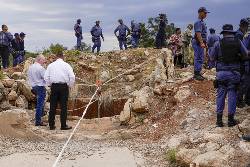STILFONTEIN, South Africa (AP) — Rescuers sent a cage-like structure down into one of South Africa’s deepest gold mines on Tuesday to bring out survivors among hundreds of illegal miners trapped for months in an abandoned shaft. More than 100 are believed to have died of starvation or dehydration.
Civic organizations and groups representing the miners say that at least 24 bodies and 34 survivors have been brought out of the Buffelsfontein Gold Mine since Friday, but more than 500 miners are still believed to be underground, many of them ill and starving. Police said they are uncertain how many remain, but it is likely to be hundreds.
Six of the bodies and eight survivors were recovered early Tuesday, said Mzukisi Jam, the regional chairperson of the South African National Civics Organization, an umbrella for civic and rights groups. Jam was at the mine.
The mine near the town of Stilfontein, southwest of Johannesburg, has been the scene of a tense standoff between police, miners and members of the local community since November, when authorities first launched an operation to try and force the miners out. Relatives of the miners say some of them have been underground since July.
Authorities say the miners are able to come out and are refusing, but that has been disputed by rights groups and activists, who have fiercely criticized police tactics in cutting off the miners' food and water supplies from the surface in an attempt to force them out. The rights groups say many of the miners are dying of starvation and unable to climb out because the shaft is too steep and the ropes and pulley system they used to enter have been removed.
“We are happy that this (rescue) operation is happening, even though we believe that if it was done earlier, we wouldn’t even have one dead person,” Jam said.
Illegal mining is common in parts of gold-rich South Africa where companies close down mines that are no longer profitable, leaving groups of informal miners to illegally enter them to try and find leftover deposits.
Large groups of illegal miners often go underground for months to maximize their profits, taking food, water, generators and other equipment with them, but also relying on others in their group on the surface to send down more supplies.
Some have escaped from the mine since November and been arrested, authorities have confirmed, although the exact number is not clear. Police say the miners are afraid of being arrested if they come out.
Rights activists said the only way out is for miners to make a dangerous trek to another shaft, which can take days, and crawl out there. They said many of the miners are too weak or ill to climb out. The mine is 2.5 kilometers (1.5 miles) deep and has multiple shafts, many levels and is a maze of tunnels, and the community mining group said there are numerous groups of miners in various parts of the mine.
Residents have gathered near the mine desperately waiting for news on family members. The community organized its own rescue operation on Friday before the official one by authorities began Monday.
“The last time I spoke to my brother was in July, when he told us that he is going underground," said Zinzi Tom, a sister of one of the miners who remained underground. "We had not heard anything from him, but yesterday one of the miners who surfaced said he saw him about two weeks ago. Apparently he is very sick and he is struggling to survive.”
The Mining Affected Communities United in Action group, which took authorities to court in December to force them to allow food, water and medicine to be sent down to the miners, released two cellphone videos which they said were from underground and showed dozens of dead bodies of miners wrapped in plastic. A spokesman for the group said “a minimum” of 100 miners had died.
The cellphone videos purportedly from the depths of the mine are filmed by a man who can be heard saying, “This is hunger. People are dying because of hunger,” as he records emaciated-looking men sitting on the damp floor of the mine. He adds: “Please help us. Bring us food or take us out.”
South Africa's minister of police and minister of mineral resources were due to visit the mine on Tuesday, while authorities have come under scrutiny for their tactics.
South African Cabinet Minister Khumbudzo Ntshavheni told reporters in November that the government would not help the miners, which they considered “criminals.”
“We are not sending help to criminals," she said, according to local media. “We are going to smoke them out. They will come out.”
___
Imray reported from Cape Town, South Africa.
___
AP Africa news: https://apnews.com/hub/africa
...


